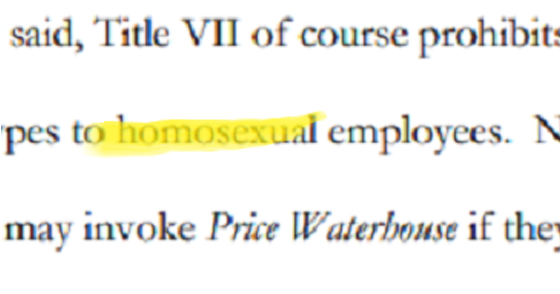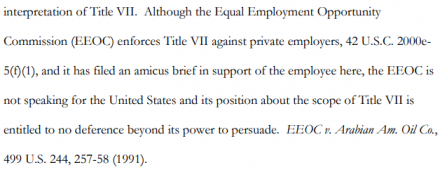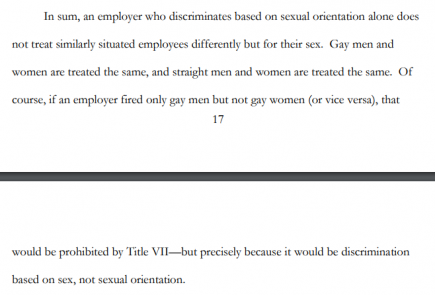Abortion rights, women of color, and LGBTQI+ people are under attack. Pledge to join us in fighting for gender justice.
The Dept. of Justice Just Argued that Employers Should Be Able to Fire “Homosexual” Employees

Yesterday was a terrible day for LGBTQ people when it comes to state-sanctioned employment discrimination. First, President Trump announced that “the United States Government will not accept or allow…Transgender individuals to serve in any capacity in the U.S. Military” — which, if implemented, would be a reversal of current military policy (although the Department of Defense weighed in today – stay tuned). There are currently between 2,000 and 15,000 active-duty transgender troops in the military who could be affected. Trump’s announcement relied on the false trope that transgender people are “burdens,” and made clear that employment discrimination against trans people is not only something the President supports, it’s something he’s willing to mandate.
As if that wasn’t enough, last night Jeff Sessions’ Department of Justice (DOJ) filed a brief in a federal appeals court arguing that current law does not protect employees from being fired on the basis of their sexual orientation. The case, Zarda v. Altitude Express, involves a skydiving instructor who alleged that he was fired for being gay, in violation of Title VII of the Civil Rights Act, a major federal law civil rights law protecting workers from employment discrimination. The legal question essentially boils down to whether prohibitions against “sex discrimination” in Title VII include prohibitions against discrimination on the basis of sexual orientation. This is a rapidly evolving area of the law, so not surprisingly, many groups, including NWLC and two federal agencies, have weighed in. There’s a lot going on here, so here’s a breakdown of what DOJ’s brief means.
DOJ Urged the Court to Ignore the EEOC
Two of the nation’s most important civil rights agencies filed briefs in this case, but on opposing sides. The Equal Employment Opportunity Commission (EEOC) is the federal agency that administers and enforces civil rights laws concerning workplace discrimination, including Title VII. The DOJ Civil Rights Division also has the authority to enforce Title VII and other employment discrimination laws against public employers, but unlike the EEOC, it isn’t solely focused on workplace discrimination. When the U.S. Court of Appeals for the Second Circuit agreed to reconsider its original decision in Zarda, the Court asked the EEOC to weigh in because of its particular expertise.
The EEOC’s brief, submitted in June, urged the court to find that discrimination based on sexual orientation constitutes sex discrimination in violation of Title VII, because it’s gender-based discrimination based on the employee’s sex and sex stereotyping. This is also the position of NWLC and numerous other women’s and civil rights organizations.
Yesterday, when DOJ filed its brief, things got strange. Not only is DOJ taking an opposing position to the EEOC; DOJ also argued that “the EEOC is not speaking for the United States and its position about the scope of Title VII is entitled to no deference beyond its power to persuade.” The DOJ is urging courts to disregard the EEOC’s interpretations of a law that it’s charged with enforcing – and this is worrisome.

The DOJ’s Arguments Are Outdated, Homophobic, and Just Plain Weird
DOJ’s brief argues that it’s settled law that Title VII’s sex discrimination doesn’t include sexual orientation discrimination, which is not the case. The EEOC and many federal courts in recent years have grappled with this issue, and in 2015, the EEOC ruled that sex discrimination includes sexual orientation discrimination, as did the Seventh Circuit. NWLC ‘s amicus brief in Zarda explains that the Supreme Court’s interpretation of Title VII’s prohibition against sex discrimination has evolved over the years to encompass a broader understanding, which includes discrimination based on sexual orientation (you can find a summary of our arguments on our blog).
DOJ’s brief also repeatedly refers to “homosexual” men and women and “homosexual employees,” giving a sense of how much the authors are living in the past – from language change to case law.

DOJ goes on to argue that it’s not discrimination based on sex as long as employers fire both gay men and gay women – somehow ignoring that gay men and women are fired on the basis of their sex in relation to their partner’s sex.

If there was any doubt about how this Administration is treating LGBTQ people, yesterday was a horrible reminder that it’s spending its resources to encourage and entrench discrimination against them. The Second Circuit will hear oral arguments in Zarda in September. Hopefully, the Court rules in favor of justice for LGBTQ people.




